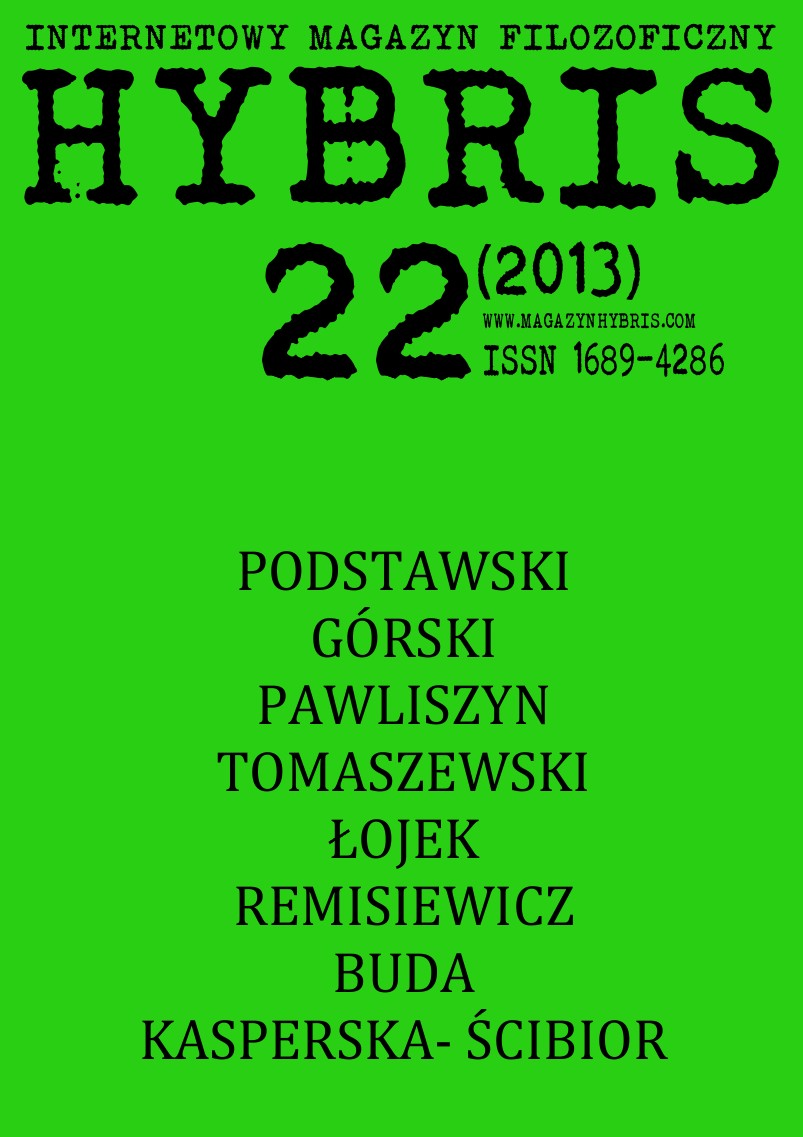Marcolphus on the philosophical margraviate. A commentary on Derrida’s ‘Margins of philosophy’
DOI:
https://doi.org/10.18778/1689-4286.22.03Abstract
In polemics with the author of ‘Margins of philosophy’, our attitude — in general — firstly stresses the transcendental aspects of European philosophy, in the frame of which it is stated that the human being has no power over that which is out of the possibility of his learning — and in that way borders on the human world as it is comprehended and determined by the human learning endowment. The border comprehended as the above, is not a hard entity, but rather — trembling-vibrating, as if a waving “tissue of corporeality” (M. Merleau-Ponty). Secondly, based on the model laid out by phenomenological meditative learning activity, we reveal that the topic of the margin deprives the center — just as the margin is the center of Derrida’s considerations…
The poetical character of the note in the margins illustrates our presumption that philosophizing grows from the life and death world — on the breach of which sometimes a scrambling-scoffing man is attached.
References
Derrida, Jacques, 2002, Marginesy filozofii, przeł. Janusz Margański, [w:] tenże, Marginesy filozofii, przeł. Adam Dziadek, Janusz Margański, Paweł Pieniążek, Warszawa.
View in Google Scholar
Husserl, Edmund, 1993a, Kryzys europejskiego człowieczeństwa a filozofia, przeł. Janusz Sidorek, Warszawa.
View in Google Scholar
Husserl, Edmund, 1993b, Zaprzeczenie możliwości filozofii naukowej — konieczność namysłu — namysł historyczny — jak potrzeba historii?, [w:] tenże, Kryzys…, Dodatki, s. 73–99.
View in Google Scholar
Husserl, Edmund, 1999, Kryzys nauk europejskich a fenomenologia transcendentalna, przeł. Sławomira Walczewska, Toruń.
View in Google Scholar
Kopaliński, Władysław, Słownik wyrazów obcych i zwrotów obcojęzycznych.
View in Google Scholar
Merleau-Ponty, Maurice, 1996, Splot — chiazma, przeł. Małgorzata Kowalska, [w:] tenże, Widzialne i niewidzialne, przeł. Małgorzata Kowalska, Jacek Migasiński, Renata Lis, Iwona Lorenc, Warszawa.
View in Google Scholar
Merleau-Ponty, Maurice, 1996, Widzialne i niewidzialne, przeł. Małgorzata Kowalska, Jacek Migasiński, Renata Lis, Iwona Lorenc, Warszawa.
View in Google Scholar
Pawliszyn, Aleksandra, 1993, Skryte podstawy rozumienia. Hermeneutyka a psychoanaliza, Gdańsk.
View in Google Scholar
Pawliszyn, Aleksandra, 2009, Ontologiczne studium metafory, Gdańsk.
View in Google Scholar
Pawliszyn, Aleksandra, 2011, Transcendentality as an Ontic Transgression, [w:] Anna-Teresa Tymieniecka (red.), Transcendentalism Overturned. From Absolute Power of Consciousness Until the Forces of Cosmic Architectonics, “Analecta Husserliana”, Dordrecht, Heidelberg, London, New York, s. 103–111.
View in Google Scholar
DOI: https://doi.org/10.1007/978-94-007-0624-8_7
Pawliszyn, Aleksandra, 2011b, Rap — opowieść kusząca umykającym sensem. Filozoficzna tkanka rapu, tekst nagrany i dołączony do płyty grupy WszyscySpięci, pt.: Uwieść filozofię rapem. Oświecenia dreszcze pieszczą mnie jeszcze, Gdańsk.
View in Google Scholar
Ricoeur, Paul, 1985, „Symbol daje do myślenia”, przeł. Stanisław Cichowicz, [w:] tenże, Egzystencja i hermeneutyka, Warszawa.
View in Google Scholar
Downloads
Published
How to Cite
Issue
Section
License

This work is licensed under a Creative Commons Attribution-NonCommercial-NoDerivatives 4.0 International License.






